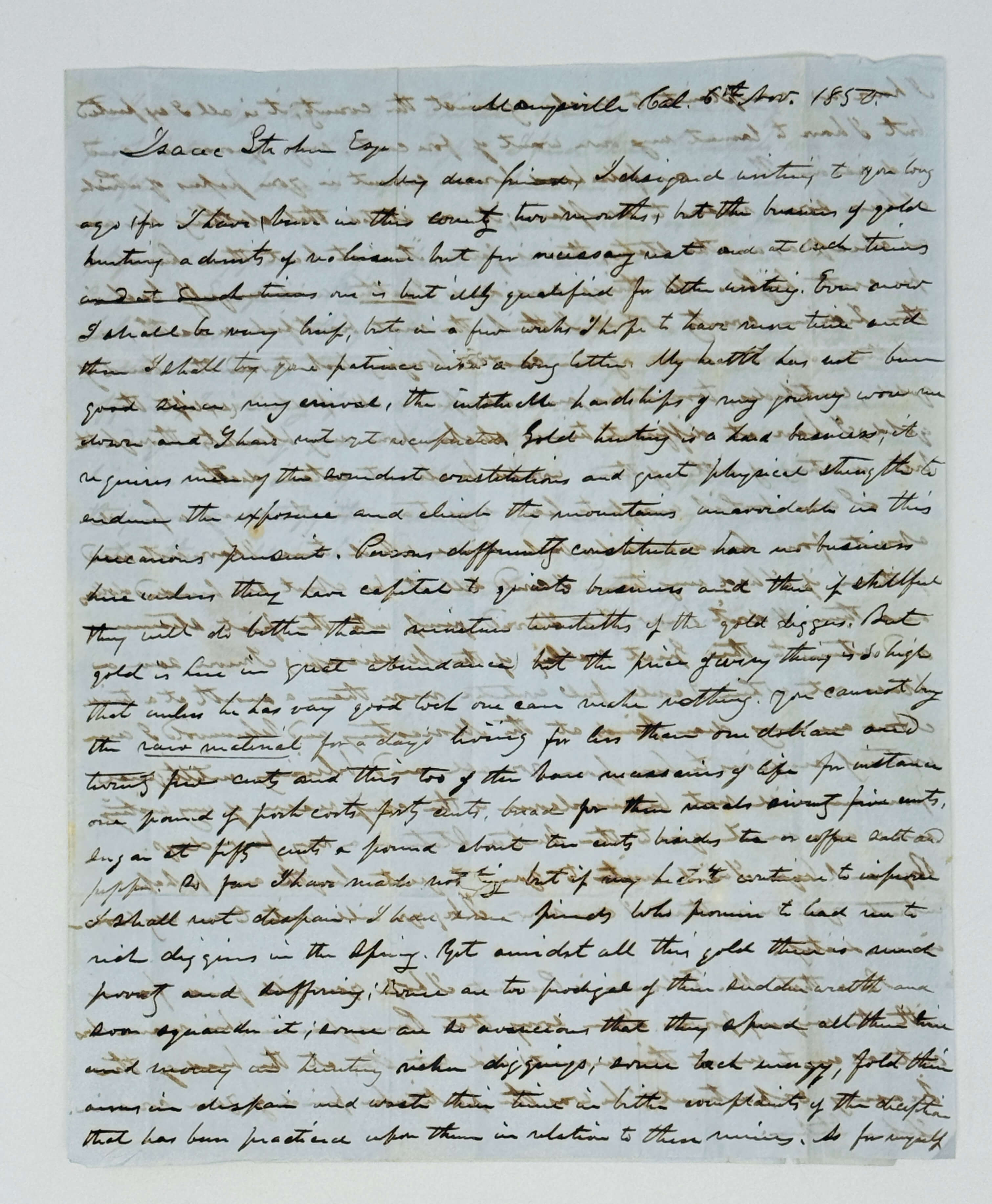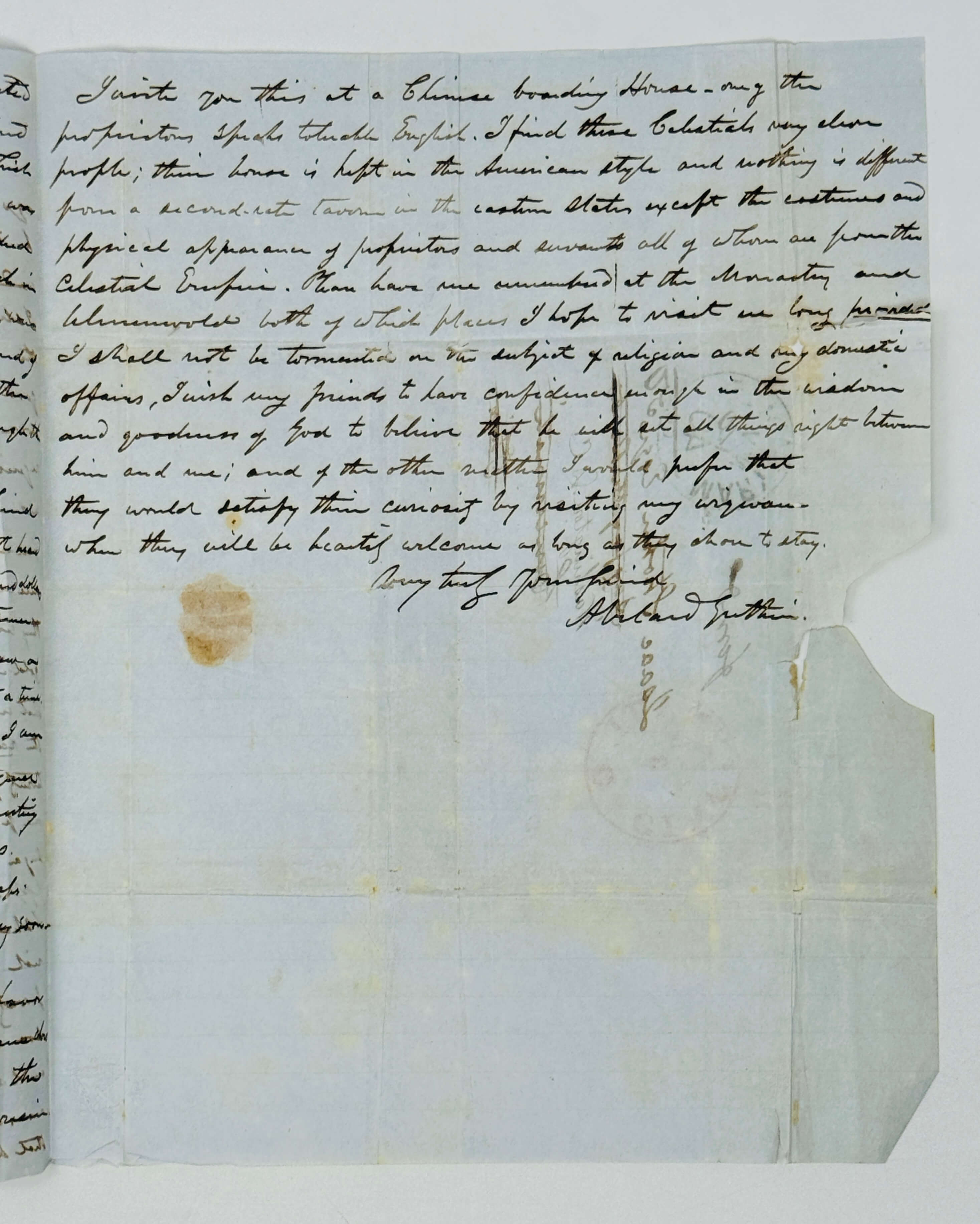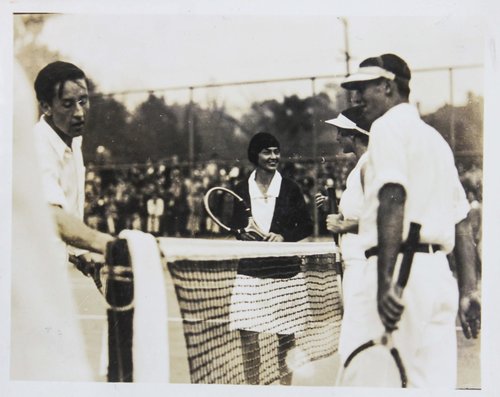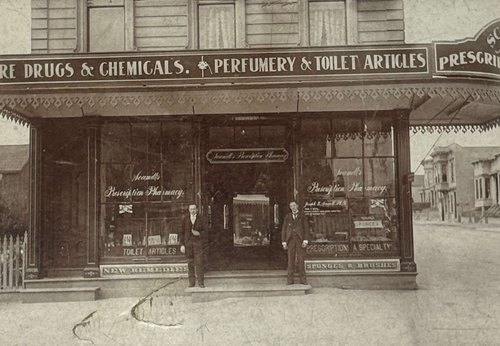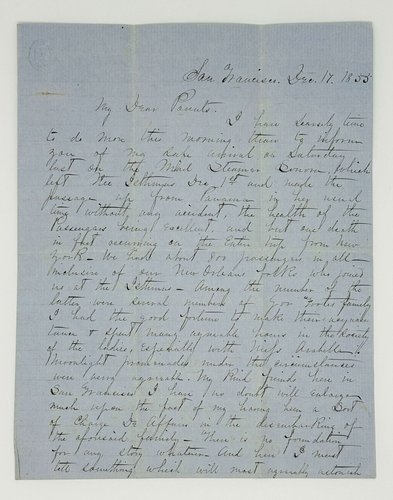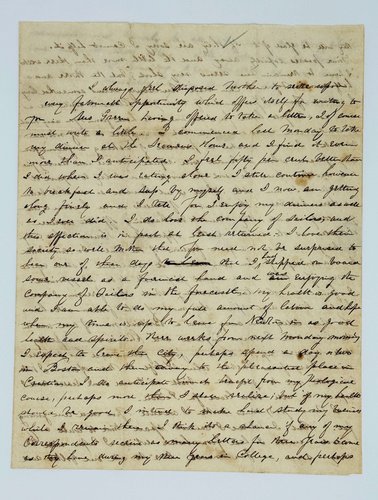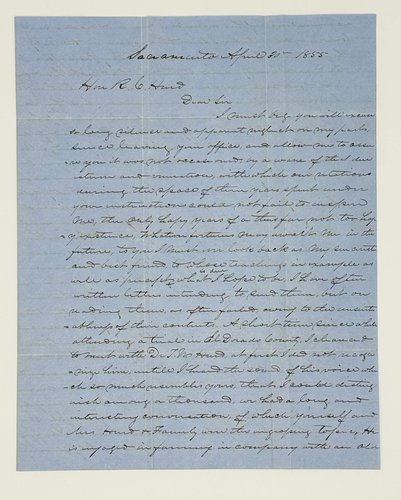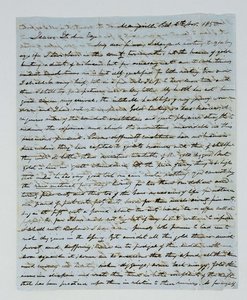
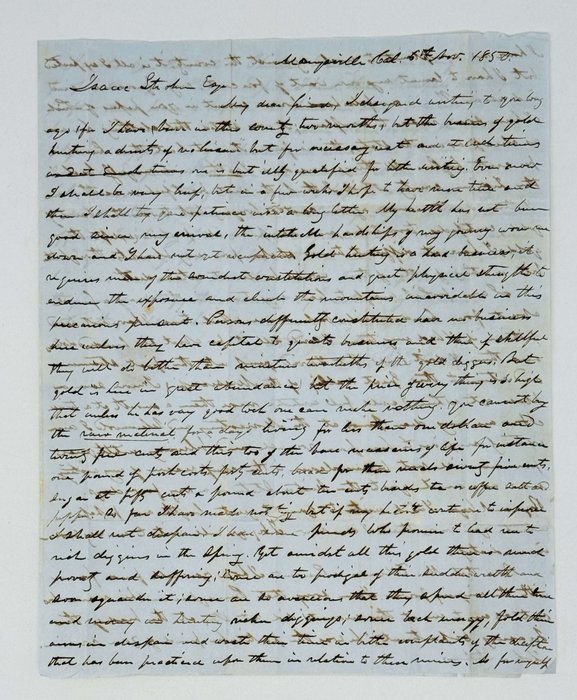
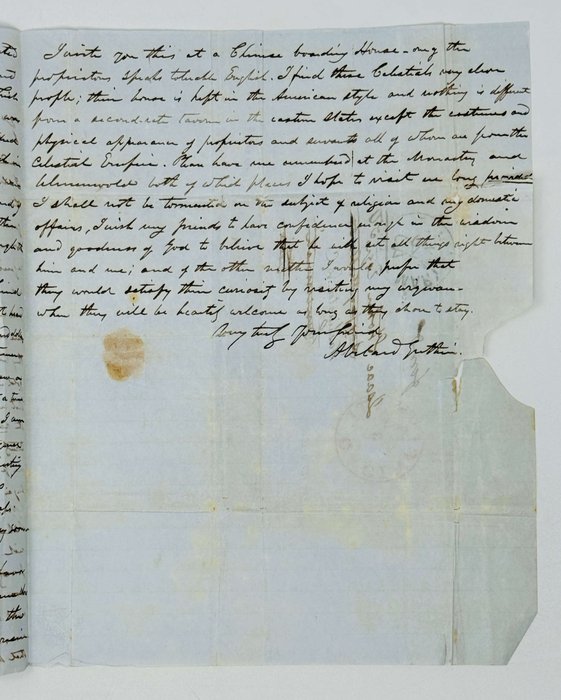
#MA11
1850
Quarto bifolium ca. 24,5x20 cm (9 ¾ x 7 ¾ in). Brown ink on blueish wove paper. 3 pp. Addressed and with two ink postal stamps on verso of the second leaf. Fold marks, several minor holes on folds slightly affecting several letters, second leaf with a couple of tears and a piece of the outer margin cut out during opening, but only slightly affecting one word. Overall a very good letter.
Historically significant, extensive, content-rich original autograph letter by a U.S. politician, pioneer of Wyandotte County (Kansas) and a founder of the township of Quindaro, Abelard Guthrie, written in the newly-founded town of Marysville in the Northern California Gold Country region during the California Gold Rush.
“Born in Ohio, Guthrie was adopted into the Wyandot tribe when he married Nancy Quindaro Brown, daughter of Chief Adam Brown, Jr. He was given the name Tah-keh’-yoh-shrah’-tseh, which means “the man with two brains”. Early in his career, Guthrie worked as a clerk for the Agent for the Ohio Indians and helped negotiate the treaty ceding Wyandotte lands in Ohio to the United States government. The Wyandots were removed to Kansas in July of 1843 and Guthrie followed them in 1844” (Kansas City Public Library online; https://www.kckpl.org/gallery/abelard-guthrie). In 1852, Guthrie went to Washington as a territorial delegate to Congress but was refused recognition. In 1856, he established the free-state town on the Missouri River, named “Quindaro” after his wife. The town initially experienced rapid development but declined during the American Civil War and was subsequently abandoned. It was placed on the National Register of Historic Places in 2002. According to the chronology of the history of Native American Tribes in Kansas, on May 15, 1850 “second group of Wyandots led by Abelard Guthrie head for California” (The Emigrant Tribes: Wyandot, Delaware & Shawnee: A Chronology/ Kansas City, 1984, p. 16; see more).
In the letter written just a few month after his arrival at the Californian gold fields, Guthrie notes on the hardships of “gold hunting,” high prices for “the bare necessaries of life” and clothing (the latter is at least “three hundred per cent” more expensive), “much poverty and suffering” and notes that he would much prefer to stay in the “Indian country which I think the most beautiful on earth; was I there I would never again cast a longing look toward the land of gold, centipedes, tarantulas and scorpions, all of which (except the gold) I have at different times shaken from my blankets though the bite or sting of either of them would be almost certain death.” He also mentions the newly-elected U.S. President Millard Fillmore, a “Chinese boarding house” where he is staying and asks his friends not to “torment” him “on the subject of religion and my domestic affairs,” adding that they could “satisfy their curiosity by visiting my wigwams where they will by heartily welcome as long as they choose to stay.”
Marysville, where the letter was written, was founded in January that year (1850) on the confluence of the Feather and Yuba Rivers. The town became a convenient stop for steamers from Sacramento and San Francisco, which brought prospectors to the diggings and received the nickname “Gateway to the Gold Fields.” The letter was addressed to Guthrie’s Ohio friend and apparently, brother-in-law, Isaac Strohm (1810-1894, married to one Margaret Guthrie). Before 1850, he worked as a clerk in the Lafayette Bank in Cincinnati, Ohio (see the crossed-out address on the last page of the letter). In 1850-1855, Strohm served in the Treasury Department in Washington, D.C. (see a referral to it in the text of the letter), as a confidential clerk to Secretary Thomas Corwin and engrossing clerk of the 34th Congress (Dills, R.S. History of Greene County together with Historic Notes on the Northwest and the State of Ohio. Dayton, Ohio, p. 734).
Overall an important rare early letter from Marysville about the early years of the California Gold Rush, written by a noted Kansas pioneer and politician.
Excerpts from the letter:
“My dear friend, I designed writing to you long ago for I have been in this country two months, but the business of gold hunting admits of no leisure but for necessary rest and at such times one is but illy qualified for letter writing. <…>
My health has not been good since my arrival, the intolerable hardships of my journey wore me down and I have not yet recuperated. Gold hunting is a hard business, it requires men of the soundest constitution and great physical strength to endure the exposure and climb the mountains unavoidable in this precarious pursuit. Persons differently constituted have no business here unless they have capital to go into business and then if skillful they will do better than nineteen twentieths of the gold diggins [sic!]. But gold is here in great abundance but the price of every thing is so high that unless he has very good luck he can make nothing. You cannot buy the raw material for a day’s living for less than one dollar and twenty five cents and this too of the bare necessaries of life. For instance one pound of pork costs forty cent, bread for three meals twenty five cents, sugar at fifty cents a pound, about ten cents brandy, tea or coffee, salt and petter.
So far I have made nothing but if my health certain to improve, I shall not despair. I have some friends who promise to lead me to rich diggins [sic!] in the spring. Yet amidst all this gold there is much poverty and suffering, some are too prodigal of their sudden wealth and soon squander it, some are so avaricious that they spend all their time and money in hunting richer diggins; some <…> fold their arms in despair and waste their time in bitter complaints of the deception that has been practiced upon them in relation to their ruins. As for myself I have no complaints to make against the country; it is all I expected but I have to lament my own want of forecast, my ignorance and indecision. There is one falsehood however in your papers of which I have some reason to complain; it was stated that clothing here was as cheap as in the States, this is false. It is at least three hundred percent higher.
All things considered I rather wish myself back in the Indian country which I think the most beautiful on earth; was I there I would never again cast a longing look toward the land of gold, centipedes, tarantulas and scorpions, all of which (except the gold) I have at different times shaken from my blankets though the bite or sting of either of them would be almost certain death.
I was foolish enough to leave my team in the care of a friend about four hundred miles back since which time I have not heard of them. If I had my team I could sell it for about six hundred dollars and then I don’t know but I would jump into the first steamer and return to the great valley of the Mississippi. I never saw a place yet when I could feel contented more than a month at a time. <…>
Now that Mr. Fillmore is President I hope you will find favor with the reigning powers. I am sorry that Pennsylvanian (his name does not occur to me at this moment) did not stay at the head of the Treasury Department; he was the particular friend of your cousin John [Strohm?].
I write you this at a Chinese boarding house – one of the proprietors speaks tolerable English. I find these […?] very clean people; their house is kept in the American style and nothing is different from a second-rate tavern in the eastern states except the costumes and physical appearance of proprietors and servants all of whom are from the Celestial Empire. <…> I shall not be tormented on the subject of religion and my domestic affairs, I wish my friends to have confidence enough in the wisdom and goodness of God to believe that he will set all things right between him and mel and of the other matter I would prefer that they would satisfy their curiosity by visiting my wigwams where they will by heartily welcome as long as they choose to stay.”

